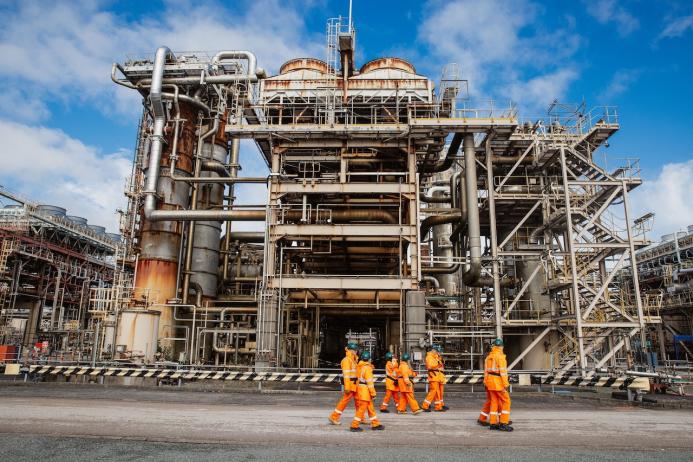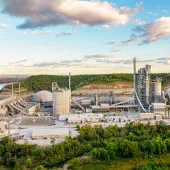MNZ | Peak Cluster partnership sets out vision to unlock CCS
Partnership calls on government for clear route to market to unlock investment and growth
IN a joint report published in Westminster today, the MNZ | Peak Cluster partnership is calling for commercially mature carbon capture and storage (CCS) projects to be provided with a clear alternative route to market, to unlock private investment to ensure the UK can hit its net-zero targets.
The MNZ | Peak Cluster partnership aims to decarbonize 40% of the UK’s cement and lime industry and ensure that close to 4 million tonnes of CO2 emissions from vital industry within the Peak Cluster will be captured and permanently stored in Spirit Energy’s Morecambe Net Zero (MNZ) carbon store each year, from 2030.
The project is set to generate the equivalent of £1.8 billion gross value added (GVA) by 2050, creating and safeguarding more than 13,000 jobs across Derbyshire, Staffordshire, and Cumbria, and attracting a further £5 billion of investment in construction and operations. It will also see a combined annual increase of £154 million in skills uplift and wage increases.
The partnership is calling for three key measures to expedite the delivery of CCS projects such as MNZ | Peak Cluster, to leverage the growth potential of CCS and deliver significant socio-economic benefits to the UK:
Provide an accelerated route to market for technically and commercially mature CCS projects. To continue to drive private sector investment in CCS and ensure that supply of carbon storage meets demand, there must be a clear additional pathway for delivery to new market participants beyond the established Track-1 and Track-2 processes.
Deliver reliable carbon pricing on which CCS business models can be based. A predictable and stable carbon price trajectory – that ensures that emitting carbon is more expensive than storing these emissions – will bolster investor confidence in UK CCS projects, drive private sector investment, and minimize the need for taxpayer support.
Begin the ‘market transition’ phase now and support workable CCS business models. The Government should support a model of CCS economic licensing that offers subsidies that are directly linked to the difference between the cost of abatement and the price of CO2 on the UK Emissions Trading Scheme (ETS). A clear, transparent, and public benchmark will mean the Government only needs to fund mature CCS projects when they are operational – meaning all development and capital expenditure will be owned by the private sector, protecting and creating jobs, and delivering higher wages without the need for significant upfront taxpayer money.
Spirit Energy – a majority-owned subsidiary of Centrica – have plans to repurpose the depleted Morecambe Bay Gas Fields in Barrow into the world-leading MNZ carbon store – offering a long-term decarbonization solution to critical national industries across the UK’s industrial heartlands. The partnership between MNZ and Peak Cluster secures a sustainable future for the heart of the UK’s domestic cement and lime manufacturing industry.
Neil McCulloch, chief executive officer of Spirit Energy, said: ‘Carbon capture and storage projects such as MNZ are going to play a pivotal role in delivering net zero in the UK and beyond. MNZ is uniquely well-placed to provide scale in the right place, at the right time, to hit government targets and deliver the CCUS Vision with greater certainty. Our ask is modest and pragmatic policy reforms that can then enable MNZ to drive industrial decarbonization, growth, new green jobs, and economic opportunities in the UK.’
John Egan, project director of Peak Cluster, said: ‘The partnership provides the UK with an opportunity to become the world’s leading producer of sustainable low-carbon cement and lime. The MNZ carbon store provides the cement and lime sector with a route to reduce carbon emissions, protect the thousands of jobs and livelihoods that depend on it, and stay competitive in a global market. With the price of carbon rising, the Government needs to support commercially mature CCS projects like Peak Cluster to enable manufacturers to unlock a permanent solution to this challenge – simultaneously creating the right economic environment for growth and decarbonization.’
Alex Cunningham MP, chair of the CCUS All Party Parliamentary Group (APPG), commented: ‘The MNZ | Peak Cluster partnership is one of the most exciting prospective CCS projects I have seen in my role as chair of the APPG. It is one of the most advanced projects in the UK, offering an opportunity to repurpose one of the UK’s largest gas fields into a world-leading carbon store, accepting carbon from an industry that has been a cornerstone of the Peak District’s economy for centuries. Beyond the significant economic benefits of the project, the scale of storage on offer makes the MNZ | Peak Cluster a project that will be nationally and internationally significant.’










